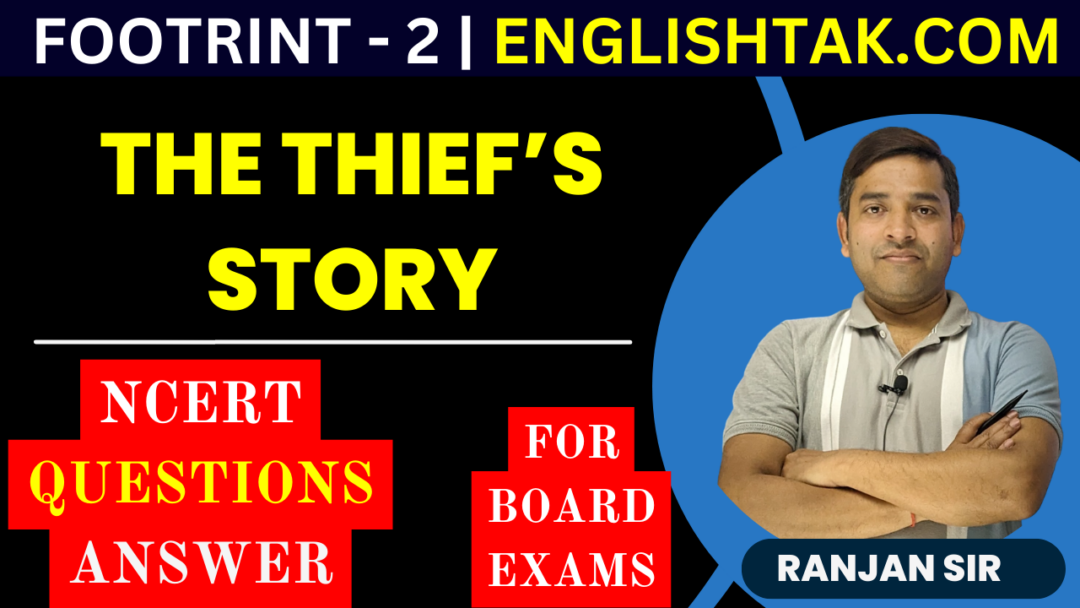![]()
Chapter 2: The Thief’s Story – NCERT Solutions Class 10 English Footprints Without Feet
Table of Contents
The Thief’s Story Class 10 English NCERT Solutions – Welcome to our detailed NCERT Solutions for Class 10 English – Footprints Without Feet – Chapter 2: The Thief’s Story by Ruskin Bond. This heart-warming and thought-provoking story explores the transformation of a young thief named Hari Singh, who learns the value of trust, education, and kindness through his interaction with a simple yet wise man named Anil.
In this blog post, we provide accurate and easy-to-understand answers to all the questions from the NCERT textbook, including:
- Read and Find Out (Page 8 & 10)
- Think About It (Page 13)
- Talk About It (Page 13)
These solutions will help students grasp the theme, character development, and moral of the story more effectively. Whether you are preparing for your board exams or simply want to understand the story better, this guide has got you covered!
NCERT Solutions for Class 10 English – Footprints Without Feet – Chapter 2: The Thief’s Story
Page 8 – Read and Find Out:
1. Who does ‘I’ refer to in this story?
Answer:
‘I’ refers to the narrator of the story, who is a 15-year-old thief. He changes his name frequently to hide his identity. In this story, he introduces himself as Hari Singh.
2. What is he “a fairly successful hand” at?
Answer:
He is “a fairly successful hand” at stealing. Despite his young age, he has become good at committing thefts and escaping without getting caught.
3. What does he get from Anil in return for his work?
Answer:
In return for his work, Anil gives him food and a place to stay. Later, Anil also starts teaching him how to cook, write his name, and add numbers, showing a personal interest in his improvement and education.
NCERT Solutions for Class 10 English – Footprints Without Feet – Chapter 2: The Thief’s Story
Page 10 – Read and Find Out:
1. How does the thief think Anil will react to the theft?
Answer:
The thief thinks that Anil will be sad, not because of the loss of money, but because he would lose trust in the thief. Anil is a simple and trusting man, and the thief feels guilty for betraying that trust.
2. What does he say about the different reactions of people when they are robbed?
Answer:
The thief says that when people are robbed, some show fear, some show anger, and some show sadness. But according to him, Anil’s face would show only sadness, which would hurt him the most.
3. Does Anil realise that he has been robbed?
Answer:
Yes, Anil does realise that he has been robbed.
Although he doesn’t say anything directly, he notices that the notes are damp and wet, which hints that he knows the thief had taken the money and returned it. Instead of confronting him, he shows trust by continuing to treat him kindly, even offering to pay him regularly from then on.
NCERT Solutions for Class 10 English – Footprints Without Feet – Chapter 2: The Thief’s Story
Page 13 – Think About It
1. What are Hari Singh’s reactions to the prospect of receiving an education? Do they change over time?
Answer:
Yes, Hari Singh’s reactions to receiving an education change over time.
- At first, he thinks about education in a selfish and clever way. He believes that if he could write like an educated man, he could commit smarter crimes and cheat people more effectively.
“I knew that once I could write like an educated man, there would be no limit to what I could achieve.”
- Later, however, his thinking becomes more mature and thoughtful. He begins to understand the real value of education, not just as a tool for trickery, but as a way to become a respected and honourable person in society.
“Whole sentences, I knew, could one day bring me more than a few hundred rupees… To be a really big man, a clever and respected man, was something else.”
This change in thinking shows that his conscience is awakening. He returns to Anil because he realises that trust, respect, and education are more valuable than stolen money. He wants to change his life and become a better person.
2. Why does not Anil hand the thief over to the police? Do you think most people would have done so? In what ways is Anil different from such employers?
Answer:
Anil does not hand the thief over to the police because he understands that Hari Singh is feeling guilty and is trying to change for the better. By not confronting him or punishing him, Anil gives him a chance at redemption.
Most people in Anil’s position would have called the police or thrown the thief out, but Anil is different. He is kind, understanding, and compassionate. He believes in giving people second chances, especially when they show signs of improvement.
Anil’s actions show that he is not just an employer — he is a mentor and a guide, someone who genuinely wants to help others grow and become better human beings.
NCERT Solutions for Class 10 English – Footprints Without Feet – Chapter 2: The Thief’s Story
Page 13 – Talk About It
1. Do you think people like Anil and Hari Singh are found only in fiction, or are there such people in real life?
Answer:
People like Anil and Hari Singh are not found only in fiction. There are many such real-life examples too.
- Some people like Anil are kind-hearted and believe in giving second chances to others, even if they’ve made mistakes.
- Similarly, some young boys like Hari Singh, due to poverty, loneliness, or lack of guidance, take the wrong path but later realise their mistakes and want to change.
This story reminds us that trust and kindness can bring out the good in people.
2. Do you think it is a significant detail in the story that Anil is a struggling writer? Does this explain his behaviour in any way?
Answer:
Yes, it is a significant detail that Anil is a struggling writer. He lives a simple and modest life with limited earnings. This explains why:
- He doesn’t have much money, yet he is generous and trusting.
- He values honesty, learning, and human connection more than money.
- He understands struggle and hardship, which might be why he is kind to Hari Singh and does not report him to the police.
Being a writer, he is perhaps more sensitive and thoughtful, and this influences his calm and forgiving nature.
3. Have you met anyone like Hari Singh? Can you think and imagine the circumstances that can turn a fifteen-year-old boy into a thief?
Answer:
Many children like Hari Singh can be found in real life, especially in big cities. Some might be orphans, others may have run away from home, or live in poverty-stricken conditions.
- Lack of education, proper guidance, or family support often push such children towards petty crimes like theft or pickpocketing.
- Their actions are often a result of survival instincts rather than evil intentions.
With proper care, education, and supportive people like Anil, they can change and lead a better life.
4. Where is the story set? Which language or languages are spoken in these places? Do you think the characters in the story spoke to each other in English?
Answer:
The story seems to be set in an Indian city, most likely a North Indian city like Delhi or Lucknow, based on the names Anil and Hari Singh and the reference to Haldiram’s sweet shop.
- In such places, Hindi is the primary language spoken, along with some use of English.
- It is unlikely that the characters spoke to each other in English, especially since Hari Singh is uneducated in the beginning.
- They most probably communicated in Hindi, though the story is written in English for readers.
CBSE Class 10th NCERT English Solution
The Black Aeroplane Class 10 Chapter 3 Summary
A Triumph of Surgery NCERT Questions Answers
Nelson Mandela Long Walk to Freedom Difficult Words with Hindi
Two Stories about Flying Summary Class 10 English His First Flight
CBSE Class 10 English Board Exam: 25 Literature Questions
Reading Comprehension Class 12 Board 2025
Most Repeated Questions in CBSE Class 10 English
Class 10 English Important Short Questions For Board Exams






